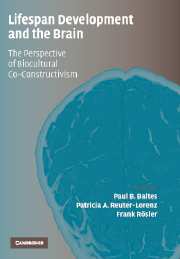Book contents
- Frontmatter
- Contents
- List of Contributors
- Preface and Acknowledgments
- Lifespan Development and the Brain
- PART ONE SETTING THE STAGE ACROSS THE AGES OF THE LIFESPAN
- PART TWO NEURONAL PLASTICITY AND BIOCULTURAL CO-CONSTRUCTION: MICROSTRUCTURE MEETS THE EXPERIENTIAL ENVIRONMENT
- 3 Neurobehavioral Development in the Context of Biocultural Co-Constructivism
- 4 Adult Neurogenesis
- PART THREE NEURONAL PLASTICITY AND BIOCULTURAL CO-CONSTRUCTION: ATYPICAL BRAIN ARCHITECTURES
- PART FOUR BIOCULTURAL CO-CONSTRUCTION: SPECIFIC FUNCTIONS AND DOMAINS
- PART FIVE PLASTICITY AND BIOCULTURAL CO-CONSTRUCTION IN LATER LIFE
- PART SIX BIOCULTURAL CO-CONSTRUCTION: FROM MICRO- TO MACROENVIRONMENTS IN LARGER CULTURAL CONTEXTS
- PART SEVEN EPILOGUE
- Author Index
- Subject Index
3 - Neurobehavioral Development in the Context of Biocultural Co-Constructivism
Published online by Cambridge University Press: 17 July 2009
- Frontmatter
- Contents
- List of Contributors
- Preface and Acknowledgments
- Lifespan Development and the Brain
- PART ONE SETTING THE STAGE ACROSS THE AGES OF THE LIFESPAN
- PART TWO NEURONAL PLASTICITY AND BIOCULTURAL CO-CONSTRUCTION: MICROSTRUCTURE MEETS THE EXPERIENTIAL ENVIRONMENT
- 3 Neurobehavioral Development in the Context of Biocultural Co-Constructivism
- 4 Adult Neurogenesis
- PART THREE NEURONAL PLASTICITY AND BIOCULTURAL CO-CONSTRUCTION: ATYPICAL BRAIN ARCHITECTURES
- PART FOUR BIOCULTURAL CO-CONSTRUCTION: SPECIFIC FUNCTIONS AND DOMAINS
- PART FIVE PLASTICITY AND BIOCULTURAL CO-CONSTRUCTION IN LATER LIFE
- PART SIX BIOCULTURAL CO-CONSTRUCTION: FROM MICRO- TO MACROENVIRONMENTS IN LARGER CULTURAL CONTEXTS
- PART SEVEN EPILOGUE
- Author Index
- Subject Index
Summary
ABSTRACT
Biocultural co-constructivism is a concept new to the field of developmental neuroscience, and thus there is no precedent for modeling how cultural processes are incorporated into the developing or developed brain. In this chapter, I offer a number of suggestions for how one might think about and study the relations among brain, culture, and development. I begin by providing a brief overview of brain development, followed by a discussion of neural plasticity. I conclude by speculating as to how culture might be incorporated into neural substrate, and subsequently and conversely, how such a remodeled brain might lead to changes in behavior.
BACKGROUND
In 1997, Bloom and I published a paper in which we lamented the lack of communication among those studying behavioral development and those studying brain development (Nelson & Bloom, 1997). We argued that the impressive advances being made on both fronts – brain and behavioral development – and our knowledge of children in general would expand exponentially if there was greater cross-fertilization across disciplines. We illustrated a few examples, emphasizing most how advances in brain imaging and in our knowledge of neural plasticity may ultimately come to revolutionize our thinking about brain–behavior relations.
The arguments in favor of studying “neurobehavioral” development are as true today as when Bloom and I first proposed this in 1997. I still contend that our knowledge of the developing brain would best be grounded in knowledge of child development, and conversely, that our knowledge of child development could be vastly improved were we to explicate the neural mechanisms that underlie behavioral development.
- Type
- Chapter
- Information
- Lifespan Development and the BrainThe Perspective of Biocultural Co-Constructivism, pp. 61 - 81Publisher: Cambridge University PressPrint publication year: 2006
- 4
- Cited by



